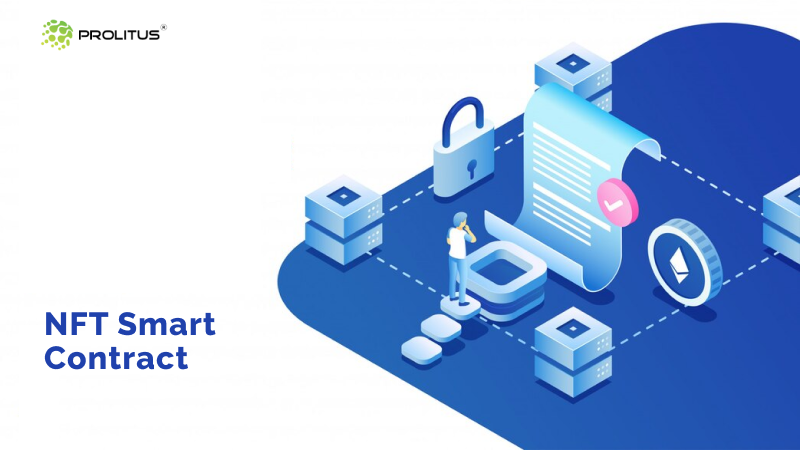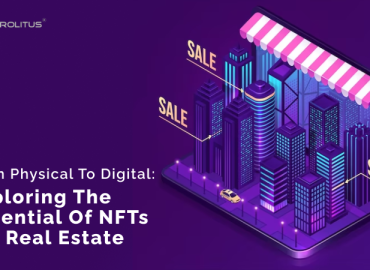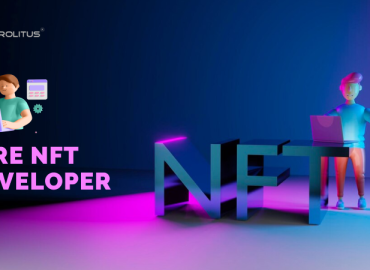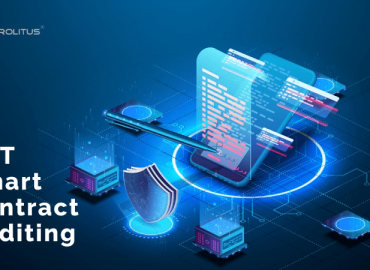Smart contracts are self-executing computer programs that are used to enforce and verify the negotiation of a contract. In the context of Non-Fungible Tokens (NFTs), smart contracts are used to automate the process of buying, selling, and transferring ownership of NFTs. NFT smart contracts are designed to provide a secure and transparent method of ownership verification and transfer without the need for intermediaries. This ensures that NFTs can be bought, sold, and traded easily, quickly, and securely, making them suitable for use in art and other industries. In addition, with smart contracts, NFTs can be programmed to have specific rules and conditions that must be met for a transaction to take place, further increasing the security and transparency of NFT transactions.
Understanding NFT smart contracts is essential for anyone who wants to take advantage of the benefits of NFTs and participate in the growing NFT ecosystem. By understanding the underlying technology and mechanics of NFT smart contracts, individuals and organizations can make informed decisions about their use and investment in NFTs.
What are NFTs
NFT stands for Non-Fungible Token, a unique digital asset representing ownership or proof of authenticity of a specific item, such as art, music, videos, or any other type of media. NFTs are stored on a blockchain, which provides a secure and transparent ledger of ownership and transfers.
There are two types of NFTs:
Utility NFTs: These tokens have a specific function or use case within a decentralized application (dApp) or ecosystem. They can be used as access keys, voting rights, or in-game items.
Collectible NFTs: These are one-of-a-kind tokens that hold a specific value based on their scarcity and uniqueness. They can represent ownership of digital art, limited-edition music tracks, or other valuable items.
Some common use cases for NFTs include:
Digital Art: NFTs are widely used to represent ownership and authenticity of digital art, providing artists with a new way to monetize their work.
Gaming: NFTs can be used as in-game items, such as weapons, skins, or even virtual real estate, giving players unique and valuable items they can own and trade.
Collectibles: NFTs can create limited-edition collectibles such as sports memorabilia, stamps, or comic books.
Music: Musicians can use NFTs to sell unique, one-of-a-kind experiences, such as VIP concert tickets or limited-edition tracks, to their fans.
Overall, NFTs provide a new and innovative way for individuals and businesses to manage, sell, and trade unique digital assets securely and transparently.
The role of smart contracts in blockchain technology
Smart contracts are self-executing contracts with the terms of the agreement between buyer and seller being directly written into lines of code. They run on blockchain technology, which provides a secure, transparent, and tamper-proof ledger. The role of smart contracts in blockchain technology is to automate and enforce the negotiation or performance of a contract, enabling trustless and direct transactions without the need for intermediaries. This can improve efficiency, reduce costs, and increase the security of transactions.
Smart contracts are also utilized for various use cases, such as supply chain management, decentralized finance, digital identity management, voting systems, and many others. For example, they can be programmed to automatically trigger actions such as releasing funds, transferring assets, or executing specific terms when certain conditions are met.
By using smart contracts, parties can engage in transactions without the need for intermediaries or intermediation costs, as the terms of the agreement are transparently encoded into the contract and automatically enforced. This helps to reduce the risk of fraud and increase the speed and efficiency of transactions.
Overall, the role of smart contracts in blockchain technology is to provide a secure, transparent, and efficient means of executing and enforcing agreements between parties without the need for intermediaries.
Advantages of using smart contracts in NFTs
The use of smart contracts in Non-Fungible Tokens (NFTs) offers several advantages, including:
Immutable Ownership: Smart contracts in NFTs enable the creation of unique digital assets that can be easily tracked and transferred, with ownership recorded on the blockchain. This makes NFTs tamper-proof and helps to establish clear ownership rights.
Automated Processes: Smart contracts automate the process of buying, selling, and transferring NFTs, eliminating the need for intermediaries and increasing the speed and efficiency of transactions.
Transparency: All transactions made with NFTs are recorded on the blockchain, making them transparent and easily auditable. This can increase the trust and confidence of buyers and sellers in the NFT market.
Decentralized Platform: NFTs on the blockchain operate on a decentralized platform, eliminating the risk of censorship or interference by centralized intermediaries. This allows for a more democratic and open marketplace for NFTs.
Programmable Properties: Smart contracts can be programmed to have specific properties, such as scarcity or the ability to generate revenue, which can increase the value and uniqueness of NFTs.
Overall, the use of smart contracts in NFTs provides a secure, transparent, and automated platform for creating and transferring unique digital assets, offering numerous benefits for both creators and buyers.
The potential for NFT smart contracts to revolutionize the art world and other industries
Non-Fungible Tokens (NFTs) powered by smart contracts have the potential to revolutionize the art world and other industries by enabling the creation and transfer of unique digital assets in a secure, transparent, and efficient manner.
In the art world, NFTs and smart contracts can eliminate the need for intermediaries, such as art galleries, to establish ownership and provenance of digital artworks. This can help artists to retain more control over their work and receive a more significant portion of sales revenue. Additionally, smart contracts can automate the process of buying, selling, and transferring ownership of NFTs, reducing the risk of fraud and increasing the speed and efficiency of transactions.
NFTs and smart contracts can also be applied to other industries, such as collectibles, real estate, and gaming. For example, NFTs can be used to represent ownership of rare or unique physical assets, such as sports memorabilia or luxury goods. In the gaming industry, NFTs can be used to represent in-game assets, such as weapons or characters, that can be bought, sold, and traded on the blockchain.
Furthermore, NFTs and smart contracts can also help to reduce the risk of counterfeiting and improve the overall security of digital assets. As the ownership and provenance of NFTs is recorded on the blockchain, it is much harder for fraudsters to create and sell fake digital assets. This can increase the trust and confidence of buyers in the NFT market.
Another potential benefit of NFTs and smart contracts is that they can create new revenue streams for artists and creators. For example, smart contracts can be programmed to automatically distribute a portion of the sales revenue to the artist or other stakeholders whenever an NFT is sold. This can provide a long-term source of income for artists and creators, even after the initial sale of their work.
In addition, NFTs and smart contracts can also help to democratize the art world and other industries. By enabling the creation and transfer of unique digital assets without the need for intermediaries, NFTs, and smart contracts can provide more opportunities for artists, creators, and buyers to participate in the market. This can help to create a more open, fair, and accessible marketplace for digital assets.
Overall, the potential for NFTs and smart contracts to revolutionize the art world and other industries is significant. By providing a secure, transparent, and efficient platform for the creation and transfer of unique digital assets, NFTs and smart contracts have the potential to bring about significant changes and opportunities in a variety of industries.
Final Thoughts
Although NFT smart contracts offer various potential use cases, such as enabling secure and verifiable ownership and transfer of valuable digital assets, enabling decentralized marketplaces for buying and selling unique items, and providing a platform for virtual experiences and gaming. However, there are some limitations to NFTs, such as scalability, accessibility, and high transaction fees on some blockchain networks. Additionally, the regulatory environment surrounding NFTs is still evolving, with potential implications for the future use of NFTs in areas such as intellectual property rights and taxation.
In the future, NFTs are expected to play a significant role in the digital economy, with potential applications in areas such as digital identity, digital art and collectibles, and virtual real estate. Furthermore, as the technology and market mature, the limitations of NFTs will likely be addressed, and they will become more widely adopted and integrated into various industries and applications.
How Prolitus can help you with NFT smart contract development
Prolitus is a blockchain technology solution provider that can assist companies with NFT smart contract development by offering the following services:
- NFT Smart Contract Development: Prolitus can develop custom NFT smart contracts that meet a company’s specific needs. These contracts can be built on various blockchain platforms such as Ethereum, Binance Smart Chain, and more.
- NFT Marketplace Development: Prolitus can help companies build decentralized NFT marketplaces that enable buying, selling, and trading NFTs.
- Integration with Existing Systems: Prolitus can integrate NFT smart contracts with existing systems and platforms to seamlessly use NFTs within a company’s operations.
- Consulting and Advisory Services: Prolitus can provide expert advice and guidance on how NFTs can be used effectively within a company and how to overcome any challenges that may arise.
Prolitus has a team of experienced developers and blockchain experts who can deliver high-quality NFT smart contract development services to companies looking to leverage the potential of this technology. By partnering with Prolitus, companies can access a one-stop solution for NFT development, deployment, and management. So if you are looking for a team who can assist you with building secure smart contracts, connect with our expert today.





